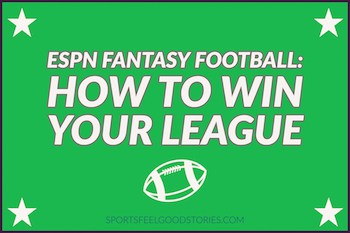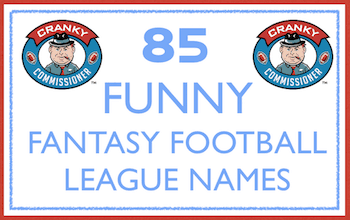Fantasy football and its participants have exploded over the course of the past 10 years. With over 60 million participants in fantasy sports, it is one of the driving forces in the popularity of the National Football League.
During the preseason, draft, and regular season, it provides fans plenty of grist for the Internet and office water cooler conversations. Who could’ve foreseen this level of popularity?
So, whether you are a participant or not, it helps to know about the game to understand the dialogue between friends and colleagues. So, with that in mind, we’ve collected some common questions that people ask about fantasy football and assigned Red Zone Rick to supply the answers. Here’s the result.
1.) What is NFL fantasy football?
Fantasy football is an interactive multiplayer fantasy sport where teams are comprised of (mostly offensive) players from the National Football League and are managed with a combination of skill and luck. Scoring is based on player statistics. Matches are played weekly, corresponding with the NFL schedule.
2.) How does fantasy football work?
A league usually comprises anywhere from 8-14 teams, and teams are established by selecting desired players through a Fantasy Football Draft or Auction. Each week team managers select the players to “start” in their lineup. Teams face off head-to-head, and the team with more points after the week is completed is the victor.
Learn more about scoring, the commissioner’s role, and drafting.
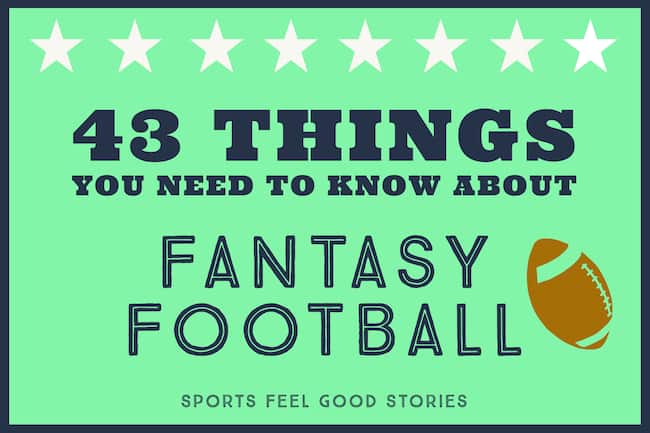
3.) Is fantasy football free?
Yes. But most leagues will create a “pot,” which is awarded to the champion at the end of the season. The buy-in can range from $5 to hundreds of dollars, depending on how serious the league and its players are.
4.) Is fantasy football gambling?
Some people would certainly argue it is. However, there is a strong degree of skill involved and not just luck. You can call it what you like, but if there are buy-ins and a victor’s pot, it sure has a lot in common with gambling.
5.) Are NFL referees allowed to play fantasy football?
No. They are not supposed to.
6.) How many people do I need for a fantasy football league?
The standard rule of thumb is that the best leagues function anywhere from 8-14 teams, with 10-12 being the target number. However, no rule says leagues can’t be formed with fewer or greater numbers, with some leagues reaching into the ’20s or more.
7.) What is the role of the league commissioner?
The league commissioner is in charge of forming and regulating the league. The commissioner creates the league and invites or authorizes the managers. The commissioner does everything from establishing the scoring metrics and setting the draft date to collecting buy-in and even policing the league. It is important to have a level-headed commissioner.
8.) How closely does fantasy football replicate the real NFL?
As any diehard NFL fan will tell you, fantasy football does not replicate the real NFL. But it does conglomerate player statistics into a scoring metric to make a number that is identified as “points.”
9.) How long has fantasy football been played?
Fantasy football has been around for decades—however, the modern way of playing really took off with the popularization of smartphones.
10.) How big is the business of fantasy football?
It’s estimated that fantasy football is a $7 billion business in the United States and Canada. Some 60 million players are involved in fantasy sports, according to the Fantasy Sports Trade Association.
In the last decade, fantasy football has gone parabolic. Every year it has been gaining popularity. Many NFL players even play now. As a result: sports talk shows, companies, websites, youtube channels, podcasts, and radio broadcasts have all been created to cater to the rising demand.
11.) Does fantasy football help or hurt the NFL?
It certainly helps the business and popularity of football. The NFL has been shifting into a more offensive league as of late, promoting more scoring and taking power away from the defenses to increase player safety while making the game more enjoyable to watch.
Viewership of games featuring lesser-known teams must improve as a result of so many fantasy football participants. Folks might continue to watch a blowout between two non-contenders to see if their running back can make it into the end zone.
12.) What are fantasy football handcuffs?
A fantasy football handcuff usually pertains to a clear-cut backup running back. The logic is if you draft a running back with one of your top picks, selecting his handcuff in the late rounds makes sense to ensure your return on investment. However, the term could apply to other positions as well.
Handcuffs predominantly ride the bench strictly as an insurance policy if something happens to the starting running back.
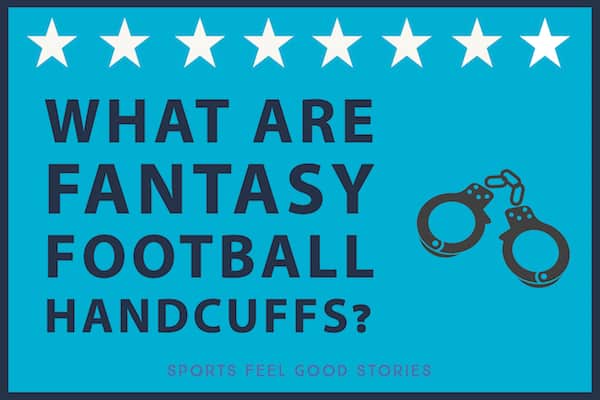
13.) What are fantasy football tiers?
Tiers are skill/ viability grades. Top-tier quarterbacks are the best of the best. Second-tier quarterbacks aren’t quite as good, etc.
14.) What’s the best way to play fantasy football with friends?
The best way to play fantasy football with your friends is to get everyone in a Yahoo or ESPN league. Plan a draft party and select a date that allows the maximum number of people to attend. Enable message boards so everyone can talk on the fantasy platform.
15.) What is the Can’t Drop List on the ESPN App?
The “Can’t DropLlist” is a designation for some fantasy football players. It is a regulatory tool that forces the owner to hold certain players on their team.
The “Can’t Drop List is made up of some of the best fantasy football players. It exists because those players are too good to become normal free agents. After all, it would disrupt the balance of a league if one team dropped their best players and another team scooped them up.
16.) What is the Waiver Wire for fantasy football?
The waiver wire is a process by which free agents can be selected. If a free agent has a breakout game or suddenly becomes the desired player to own for any reason, the waiver wire is an organized selection process that gives everyone a chance to place a bid on the player.
Depending on the settings, the player will go to the team that bid the most or own the lowest (best) pick in the waiver.
17.) How do you keep score for fantasy football?
If you use one of the popular platforms, you will not need to do any work to tabulate the scores. The platform will do it automatically and update your team points in real-time. The score is a sum calculated via stats for the players starting on a fantasy team.
18.) When should fantasy football begin?
It’s never too early to start planning, but the fantasy season doesn’t begin until Week 1 of the regular season. That means that the league and draft all need to be completed before Week 1 begins. Most people choose a date that is around Labor Day because the preseason is completed.
19.) What player position is the most important for fantasy football?
The three most important positions are running back, wide receiver, and quarterback. Quarterbacks tend to score many points, but the difference between a middle-of-the-road QB and a top-tier QB can be relatively small compared to other positions.
In a point-per-reception format, the wide receiver is the most important position because they have the ability to score the most points. Running backs are most important in standard-scoring leagues because of their ability to score short-yardage touchdowns.
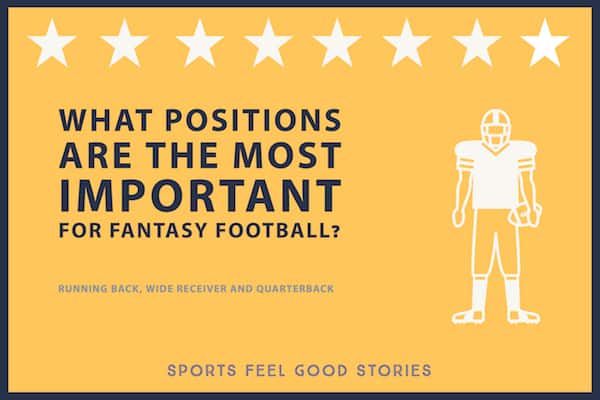
20.) When do fantasy football playoffs start?
That depends on the league settings, but the standard first week of the playoffs in Week 14. Playoffs will usually continue into Week 15, and the championship will happen in week 16. These are the best weeks because all the bye-weeks have been completed. Week 17 is avoided because too many NFL teams rest starters or have already mailed it in for the year.
21.) What are stat corrections?
Stat corrections are exactly what you think they are. When a stat is changed (due to a previous error in recording the stat), it often affects a player’s score. So a stat correction can sometimes change the outcome of a game. They are rare but occasionally do happen.
22.) When do stat corrections come out for fantasy football?
They usually come out as soon as they are discovered and can be corrected. This can be within minutes or days. Most stat corrections happen quickly.
23.) How to set up the draft?
The best way to set up a draft is to find a date and time when everyone can participate. Many people enjoy having a draft party where people physically gather at a planned location to draft. The computer should be instructed to randomly assign drafting positions to each team 1-hour before starting the draft.
24.) How many players on each team?
The standard fantasy team has 9 starting positions and 6 bench spots. This makes for 15 players on a team. Some leagues allow an Injured Reserve spot on the bench only for players that are unable to perform.
25.) How do I prepare for the draft?
The draft is a delicate balance between improv and preparation. The best advice: have a group of players you want to target for all draft stages (Early, middle, late) but don’t fixate on any one player. Most leagues allow trades, so even if you miss out on a guy, there are still ways of acquiring him.
A.) Read, watch, and listen to suggestions from a variety of sources. Podcasts, NFL Fantasy Live, and ESPN articles are a great place to start. Nobody truly knows what is going to happen this season, so get a variety of opinions. A good starting spot is the NFL Fantasy Football HQ.
B.) Do some mock drafts. ESPN has a great mock draft client, and it will give you some valuable experience for what the draft will feel and look like.
C.) Create a cheat sheet. Like a grocery list, it’s always helpful to have a list to help you remember what you want to get. (But make sure to keep it to yourself on draft night).
D.) Develop your draft strategy. You may elect to go heavy on running backs the first four rounds. In comparison, others might consider just taking the best player available every round. You may choose to zero in on players from teams with potent offenses. Whatever you believe will work, keep the strategy in mind so you won’t be flustered under the bright lights of draft night.
E.) Pray to the fantasy gods that the players you desire to fall your way.
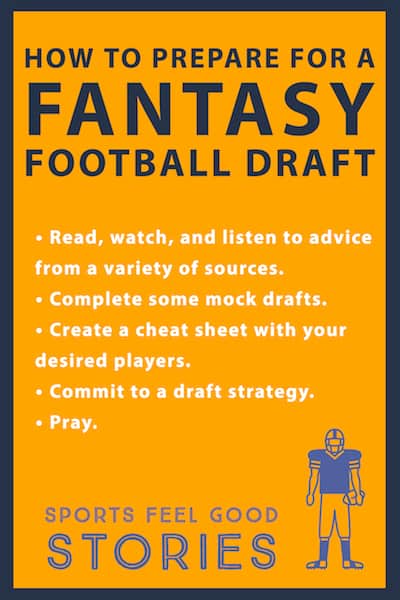
26.) What is a fantasy football sleeper?
A sleeper is someone that has big potential, but most people don’t expect a strong performance. Sleepers often are boom/bust candidates. They can be excellent value picks/ plays when they work out. And huge headaches when they don’t.
27.) What are some drafting strategies?
A few pointers:
Never take a defense or kicker before the last few rounds.
Tight ends are volatile so investing a lot in one isn’t always the best decision.
Quarterbacks tend to score many points, regardless of whether they are top-notch or a few degrees below the top tier. There can be an excellent value in waiting on a QB.
In a PPR league (point per reception), a running back that also catches the ball out of the backfield is extremely valuable.
Try not to reach anyone in the draft. Due to the drafting position you draw, you may be put in a position where you will miss out on a guy you are targeting unless you reach on him a round or two early. Avoid reaching. *instead, it is better to select a guy that is sliding.
Start the draft by taking wide receivers and running backs. This is a safe strategy through the first 4 rounds.
Check out more strategies to win below.
28.) Why is it so important to have a good fantasy football team name?
Because the main reason to play fantasy football is to have fun, so having a fun name supports the bottom line. Your team name is a reflection of you as an owner – make sure it’s a good one. Here are some Fantasy Football Team Names.
29.) Do leagues get custom names as well?
Yes. Consider its branding. If you are starting a league, a great way to get people interested and keep them interested for next year is to have a memorable league name.
We’ve made it easy for you with a list of 85 suggested names.
30.) What type of awards does the league champ usually win?
There are a lot of creative ways out there to reward the league winner. Usually, the prizes are detailed before the draft begins. The most common way is to present them the 1st place prize winnings (gathered from the entrance fees); 2nd place commonly gets a consolation prize.
Other ways to award the champion:
A seat at the Champions table – a dinner of champions bought with the entrance fees and hosts all of the champions from years prior, with the guest of honor being the reigning champ.
A trophy that is engraved each year with the team name of the newest champion.
A belt that is handed from last year’s champion to the new reigning champ.
A plaque validating the victory.
Even a custom champion’s ring if your league is really into it.
Fantasy Football Award Certificates. Personalize and send out awards weekly and at the season’s end.
31.) How to decide which player to start or sit?
The age-old question. 50% skill, 50% luck. The first factor: consistency. A consistent producer should be favored over a boom-bust producer.
The next thing to consider is an opportunity: is there a reason one player might shine particularly bring this week because of the matchup or changes in the offense? And the other factor is the “gut feeling.” Trust your gut if it is telling you to start a guy.
32.) How do I get better at fantasy football?
Knowledge is power. Listen to podcasts, watch fantasy reports, and most of all, watch the games. The more you know, the better. And if you want to get better as the season goes on: be active on the waiver wire as often as it takes.
If an impressive player is available, it doesn’t benefit your team to let him go to someone else’s team.
33.) What tips do you have for after the draft is complete?
Don’t get too attached to any player. Seek trades. Winning games early in the season are more important than the middle of the season, so get yourself ready to win right away.
Don’t overreact to the first week: sometimes, the players that show up on Week 1 are more of a mirage than an indication of what they will produce all season. And that’s the same for big players that start slow.
34.) What is the most important thing for beginners to know?
You are never out of the playoffs until you are mathematically eliminated, so never give up on a season, even if it seems bleak. Fantasy outlooks can pivot and change on a single player, so keep trying regardless of if the outlook seems dim.
35.) What are the rookie rankings?
Rookie rankings won’t really begin to pan out until preseason. Rookies can be great potential producers for your team at a lower price, but that’s because of the inherent risks associated with their lack of NFL experience.
36.) Is it important to keep up with fantasy football news?
Yes. Fantasy football is a different valuation scale than standard NFL football, so you must keep up-to-date on fantasy news as well as news from around the NFL.
37.) What is daily fantasy football?
Daily fantasy football functions with many of the same scoring metrics as season-long fantasy football but without the need of a league or a season-long team. Players are selected on a budget, and the goal is to produce the maximum number of points with that budget by selecting the best performers of that week for their value.
DraftKings and FanDuel are the most popular daily fantasy platforms. Daily fantasy is usually played with money on the line.
38.) Do other sports incorporate a fantasy game?
Yes, virtually all sports have a fantasy version now. Basketball, baseball, and hockey are some of the most common, but everything from soccer to cricket can also be played.
39.) Should there be a punishment for getting the last place?
A fairly common strategy for leagues is to incorporate a last-place punishment. It is usually something fairly mild but undesirable. The purpose of this is to keep all managers competitive throughout the entire season to avoid having to serve the punishment of the last place.
Some examples from leagues include extreme options like forcing the loser to get a tattoo of the other owners’ choosing. Or forcing the biggest loser to take the ACT again. More reasonable leagues might make the loser bring the food to next year’s draft.
40.) Do commissioners have veto power?
Most leagues will enable the managers to vote on whether a trade is fair, which gives the league the ability to deny a trade that will benefit one team too heavily. Some leagues enable the commissioner to veto certain trades deemed unfair.
41.) When do players “lock in” to the starting spots?
Most leagues have players locked in at kickoff. That means when an NFL game starts. A player cannot be moved from the bench to a starting spot or from a starting spot to the bench. For example, only players belonging to the two teams playing Thursday will lock in at kickoff for a Thursday night game.
42.) Are there players that can play multiple positions?
Yes, but it is rare. Sometimes a player can be slated as either an RB and WR or any combination, as long as they legitimately play that position.
43.) Is it smart to trade away your best player?
Over the duration of the season, you will probably receive trade offers for your best player. Use caution against trading him away–there is a reason other managers are trying to get him. Instead, make a counter trade that has more value for you. If the other manager really wants your guy, they might be willing to overpay.
The Future for Fantasy Football
As you can see, the game has created its own lingo, strategies, and tactics for success. Will fantasy’s surge in popularity continue? Hard to say, but there are reasons so many folks are currently involved. They enjoy the game.
And, while we can give you some of the basics in Q & A format here, one of the best ways to learn the game is not to dip your toe in but rather to jump in and join a league. Give it a shot and see what you think.
By Red Zone Rick
Rick dreams in color, which usually takes the form of football diagrams and mock draft notes. His credo of “Knowledge is Power” has served him well for the many fantasy leagues he participates in.
Extra Points
10 Reasons to Love Fantasy Football
Sunday Night Football Schedule


